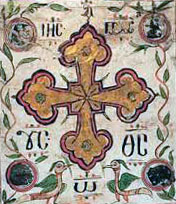 01 - 02 - 01 - 25 - Lamentation - Commentary on the Book of Lamentation
01 - 02 - 01 - 25 - Lamentation - Commentary on the Book of Lamentation
Commentary on the Book of Lamentation
Father Tadross Y. Malaty
A PREFACE FUNERAL SONGS
BITTER MOURNING, OR NEW HEAVENLY MERCIES?!
Standing in awe before this book, man will have his whole being retreat to see God’s exalted love for all mankind, and will get in touch with God’s holiness, who, in spite of His love for sinners, even while chastening them, He does not endure sin. This book will always remain a source of comfort for the wounded souls, opening the gates of heaven before them. It also bears a prophetic portrait concerning the Lord Christ, the Saviour of the world, who has delivered Himself a sacrifice for mankind, yet was not received by His own, who intended to get rid of Him. And It is, as well, the book of every believer whose broken heart burns with love and desire for the salvation of the whole world.
(1) Beyond the desolation of the temple, and the captivation of the people, the prophet Jeremiah saw a painful portrait of a people chosen by God to enjoy His divine bosom, to set them a living role model for all mankind to imitate, to forsake idol-worship and abominations, to believe in the living God, to get attached to Him, and to enjoy His fatherhood; Then, saw them perverted to sin, preferring the corrupt life to the fellowship with God. For the sake of chastening them, God allowed for them to be delivered to, and enslaved by a heathen people; so that by letting them taste the bitterness of sin and its perdition-bringing fruit, they would forsake it and return to Him, the way all humanity does all along the generations.
(2) Portraying the bitterness of sin, we could perceive that what dwells upon us of chastisement – however harsh it may seem – comes from a loving heavenly Father who anticipates our return to Him. “We love Him because He first loved us” (1 John 4: 19).
(3) Although the title of this book refers to that it is funeral songs, namely, lamentations fit for death itself, Yet, with all the bitterness they bear, they present comfort for the wounded souls, open the gates of heaven before us, and bring us back to the divine mercies.
(4) This book, bears, as well, a prophetic portrait concerning the suffering Lord Christ; starting by bitterly revealing what have dwelt upon the ancient people because of their denial of Christ whom the fathers and the men of God, for so long, have anticipated His coming; And portraying the city of Jerusalem and the promised land as in a calamity, of which there is no way out; Yet in the middle of the book (Chapter 3), the prophet gets in touch with God’s mercies, shining each morning, once man forsakes his denial, and receives faith in the Sun of Righteousness (3: 22- 23), and once the rich grace of God and His endless mercies on humanity are revealed.
(5) Those lamentations reveal a broken loving heart burning with love for his people and desiring to see all restore the lost glory. The author is a witness of the desolation of Jerusalem on the hands of Nebuchadnezar of Babylon in October 587 B.C.
The desolation of Jerusalem, as far as the prophet Jeremiah was concerned, was not merely the loss of a strong and magnificently beautiful capital, being the city of God embracing His unique temple, and representing the presence of God among His people; But the prophet felt that that desolation refers to the departure of God’s glory from the city, the temple, and the people; Yet in hope, he anticipated the glorious divine salvation. For him, the shock was beyond his endurance, whether on account of the Babylonian invasion, or the people’s denial of the Lord Christ. He cried out in pain, wept, and called his people for prayers, and for their return to God by practical repentance.
It is a book for every believer, whose heart kindles with love for all mankind, who, not enduring to see the perdition of anyone, whatever his race or circumstances; moans, seeking the salvation of all humanity; and cries out together with the prophet, saying: “O my anguish l, my anguish! I writhe with paint! O the walls of my heart; My heart is beating wildly; I cannot keep silent; for I hear the sound of the sound of the trumpet, the alarm of war” (Jeremiah 4: 19); “Oh, that my head were water, and my eyes a fountain of tears, that I might weep day and night, for the slain of the daughter of my people”
